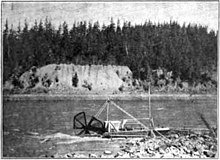Washington v. Washington State Commercial Passenger Fishing Vessel Association
[3] Importantly the treaties allowed Indians to continue fishing at "all usual and accustomed grounds ... in common with all citizens of the Territory.
[4] As a result of this, the US brought suit against Washington in support of the Indian's right to fish.
The Game Department argued this only allowed access to fishing grounds and exemptions from license fees.
The Fisheries Department argued this allowed a "fair and equitable share", which they decided to be one-third of the salmon in a run.
The United States argued that it gave them 50% of the salmon in a run or to their needs, whichever was lower.
Washington was required to provide a "moderate living" to the tribes, which Boldt decided to be 50% of the fish (taking the United States treaty interpretation).
Due to conflict between state and federal treaty interpretations, the Supreme Court granted certiorari to review the decisions.

